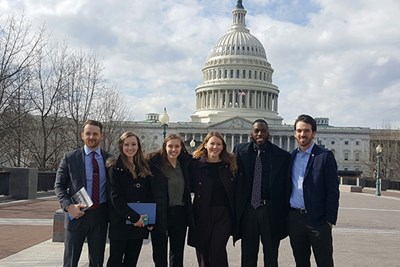Operation250 Teaches Online Safety to Students, Teachers and Parents
 Image by Tory Wesnofske
Image by Tory Wesnofske
09/25/2018
By Katharine Webster
This is how it begins.
A high school student, a Russian immigrant, goes online to vent about being bullied. Soon, he’s got a bunch of online “friends” who tell him he doesn’t need “those losers” at his school.
Over time, they encourage his anger at the United States by sharing news stories about U.S. airstrikes killing civilians in Syria. When he asks what he can do about it, they invite him to move to a private messaging app.
He’s now part of a terrorist network.
When Operation250 started as a UMass Lowell student project, at least 250 Americans had left the United States to join the Islamic State group, also known as ISIS. Now a fast-growing nonprofit, Op250 aims to prevent more young people from joining by teaching children, teenagers, parents and educators about extremism and online safety. And its mission has expanded beyond ISIS to include all kinds of terrorist and hate groups, both domestic and international.
Op250 just got a giant boost for its work: It is the subject of a $1 million U.S. Department of Justice grant for UMass Lowell to develop and evaluate the program, in partnership with two other universities.
 Image by K. Webster
Image by K. Webster
“We are happy, excited and pleased,” says Tyler Cote ’17, one of the current and former students who created Op250 under the guidance of Asst. Prof. of Criminology Neil Shortland, the principal investigator on the grant. “Now we can develop everything we’ve done tenfold. Most importantly, the grant involves us going into classrooms, interacting with students, teachers and our community partners.”
Op250 began when 10 interns in the university’s Center for Terrorism and Security Studies volunteered to enter the U.S. Department of Homeland Security’s “Peer-to-Peer: Countering Extremism (P2P)” competition in fall 2016. Shortland is the center’s director. They came up with the idea for an educational website.
Five students stayed with Op250 the following semester and traveled to Washington, D.C., to present their project to judges from Facebook, the Department of Homeland Security and the National Counterterrorism Center. They won third place, and went on to develop Op250 through the university’s DifferenceMaker program, winning the top universitywide DifferenceMaker award in spring 2017.
Last fall, the five began piloting Op250 in elementary and middle school classrooms in North Adams. Cote graduated from the Honors College in December with double majors in criminal justice and political science and then became Op250’s first full-time employee, thanks to prize money and seed donations from alumni, including counterterrorism expert and former National Security Council member Roger Cressey ’87.
 Image by Courtesy
Image by Courtesy
All five team members remain involved. Jonas Perribia ’17 and Jamie Keenan ’18, both criminal justice majors, and Danielle Thibodeau ’17, who double-majored in criminal justice and psychology, have graduated and are now employed, but they help with research and editing.
Nicolette San Clemente, now a senior majoring in international business, oversaw Op250’s incorporation as a nonprofit. She worked full time with Cote this past summer on research, content development and strategic decision-making.
This summer, Cote and San Clemente also ran a workshop on internet safety and hate groups for two dozen Somali-American teenagers in Boston, with help from two Somali community organizations and Harvard University researchers. The teens were a very different group than the mostly white seventh-graders in rural North Adams.
“We like to do unique interventions in every classroom, instead of having a cookie-cutter model,” says Cote, who spent much of the summer researching the best educational methods to start a meaningful conversation with the Somali-American teenagers.
“The two main goals of Op250 are increasing online safety and decreasing risky decision-making online. Ultimately, we want a program that we can take anywhere,” Shortland says. “The UML team’s job is to say, ‘What is Op250? What does it do and how does it do it?’ In order to measure it properly, you have to develop it logically.”
The Harvard team that worked with Op250 on the Somali education project already has a Department of Justice grant to evaluate ongoing P2P projects, and Op250 is one of its case studies. Under the new grant, the Harvard researchers will continue helping with the formative evaluation, getting the program in shape for a formal trial and evaluation.
In the second phase of the two-year grant, Op250 and experts in program evaluation at Georgia State University will test the program on hundreds of high school students in North Adams. They will then follow up and compare the online behavior of those who go through the training to a matched group of their peers who don’t get the intervention.




